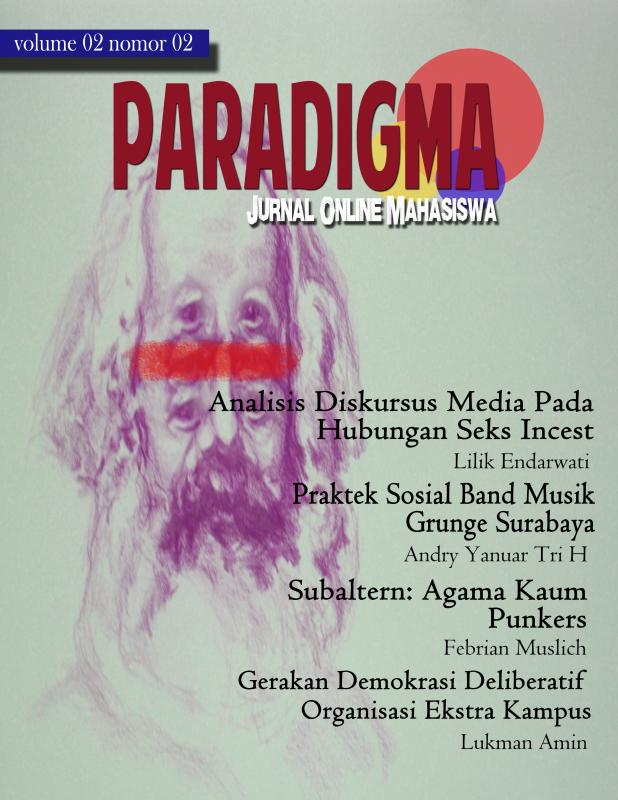Abstract
Abstrak
Pelaksanaan demokratisasi di negeri ini memerlukan respon dan kepekaan dari masyarakat tentang posisi masyarakat sebagai aktor dalam sistem ini. Salah satu yang harus diperkuat adalah masalah civil society. Gerakan mahasiswa tidak bisa dipisahkan dari proses demokratisasi yang berlangsung di negara ini. Beberapa tonggak sejarah menunjukkan peran mahasiswa yang sangat vital. Beberapa perubahan rezim dalam konstelasi politik Indonesia selalu melibatkan peran mahasiswa sebagai aktor. Mahasiswa sebagai wujud partisipasi golongan intelektual dalam upaya menentukan arah pendulum kepemimpinan Negara. Penelitian ini menggunakan metode penelitian kualitatif dengan pendekatan fenomenologi. Penelitian ini mengambil lokasi di Universitas Negeri Surabaya. Teknik yang digunakan dalam pemilihan informan yaitu dengan cara purposive. Sementara itu, untuk teknik pengumpulan data dalam penelitian ini menggunakan dua cara yaitu primer dan sekunder. Teknik analisis data yang digunakan adalah metode deskriptif kualitatif. Hasil dari penelitian ini adalah bahwa dalam menjalankan setiap gerakannya organisasi ekstra kampus selalu melalui proses pembentukan ruang publik. Pembentukan ruang publik ini dijalankan untuk membangun suatu opini mahasiswa terkait suatu permasalahan di ranah kampus yang perlu mendapat respon dari arus bawah dan merupakan proses awal demokrasi deliberatif. Selain itu, ruang publik organisasi ekstra kampus UNESA, ruang publik menjadi sarana komunikasi antar mahasiswa dalam membahas setiap problematika di ranah kampus yang perlu mendapatkan tanggapan secara langsung dan memiliki bentuk yang berbeda-beda setiap organisasi ekstra kampus. Terakhir adalah tindakan komunikatif organisasi ekstra kampus yang berbentuk suatu pandangan dari organisasi ekstra kampus serta penyikapan dalam merespon kebijakan kampus. Pandangan dari organisasi ekstra kampus merupakan cara pandang dari organisasi ekstra kampus dalam mengkritisi kebijakan kampus.
Kata Kunci: Ruang publik, Demokrasi Deliberatif, Organisasi dan Mahasiswa.
Abstract
Implementation of democratization in the country requires a response and sensitivities of people about the position of the communities as actors in this system. One of which must be reinforced is a matter of civil society. The student movement cannot be separated from the process of democratization that took place in the country. Some milestone demonstrates the role of student who is very vital. Several future modifications of the regime in Indonesia's political constellation always involves the role of students as actors. Students as a form of participation of the intellectuals in an effort to determine the direction of the pendulum's leadership of the country. This research uses qualitative research methods with the case study approach. of fenomenology. This study take place in Surabaya State University. The techniques used in the selection of the informant i.e., purposive manner. In the meantime, for data gathering techniques in this study using two ways: primary and secondary. Whereas, data analysis techniques used are qualitative, descriptive methods. The results of this research is in running any extra campus organization movement has always been through the process of the formation of public spaces. The creation of public space is run to establish a student opinion regarding a matter in the realm of the campus that need to get response from the Undertow and a inception process of deliberatif democracy. Next up is the public space extra campus organization UNESA, public space becomes a means of communication between students in discussing any problems in the realm of the campus that need to obtain responses directly and dimensionally different Extras each organization on campus. Communicative action is the last extra campus organization in the form of a view of the campus as well as how the extra organization in responding to the policies of the College. The views of the organizations on campus is a great way of extras from the extra organization campus in critiquing campus policies.
Keywords: Public space, Organization, Deliberatif Democracy and Students.
Downloads
Downloads
Published
How to Cite
Issue
Section
 Abstract views: 185
,
Abstract views: 185
, PDF Downloads: 204
PDF Downloads: 204


